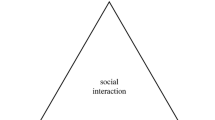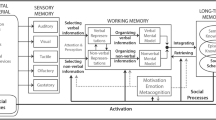Abstract
The technology of the future will bring a new, world-wide, interactive but virtual social experience to our parlors and desktops in place of face-to-face relationships. Governments will stand or fall on the basis of electronically mediated communication with masses of people. Adventures in this new open large group context in the outer world, and the maturation of our inner selves may mirror as well as contribute to each other. Small group experience and group therapy, in particular, may play a vital role.
Similar content being viewed by others
REFERENCES
DeMare, P., Piper, R., Thompson, S. (1991). Koinonia: From hate to dialogue in the large group. London: Karnac Books.
Eliot, T. S. (1942). Collected poems: 1909-1962. New York: Harcourt Brace. 1963, p. 208.
Foulkes, S. J. (1975). Problems of the large group from a group-analytic point of view. In The large group, dynamics and therapy, edited by L. Kreeger. London: Constable.
Freud, S. (1930). Civilization and its discontents. In J. Strachey (Ed. & Trans.) The standard edition of the complete psychological works of Sigmund Freud (Vol. 21, pp. 64–145). London: Hogarth Press. 1961.
Klein, E. B. (1993). Large groups in treatment and training settings, Group, Vol. 17, # 4, pp. 198–209.
Miller, E. J., and Rice, A. K. (1967). Systems of organization. London: Tavistock.
Pines, M. (1983). Psychoanalysis and group analysis. International Journal of Group Psychotherapy, 33, 155–170.
Remarque, E. M. (1928). All quiet on theWestern Front. translated by Wheen, A.W. NewYork: Fawcett Crest.
Rice, A. K. (1965). Learning for leadership. London: Tavistock.
Rioch, M. J. (1970). Group relations: Rationale and technique. International Journal of Group Psychotherapy, 20, 340–355.
Rioch, M. J. (1971). “All we like sheep..” (Isaiah 53:6): Followers and leaders. Psychiatry 34, 258–273.
Shields, W. (in press). The subjective experience of the self in the large group: Two models for study. International Journal of Group Psychotherapy.
Skynner, A. C. (1984). Group analysis and family therapy. International Journal of Group Psychotherapy, 34, 215–224.
Turquet, P. (1975). Threats to identity in the large group. In L. Kreeger (Ed.), The Large Group, Dynamics and Therapy, (pp. 87–144). London: Constable.
Author information
Authors and Affiliations
Rights and permissions
About this article
Cite this article
Shields, W. The Virtual Universe, the Open Large Group, and Maturational Processes in the Future. Group 24, 33–48 (2000). https://doi.org/10.1023/A:1007503204361
Issue Date:
DOI: https://doi.org/10.1023/A:1007503204361




